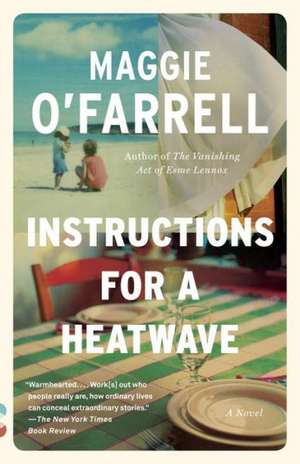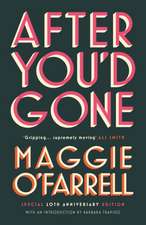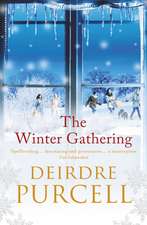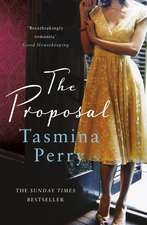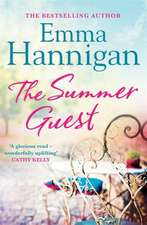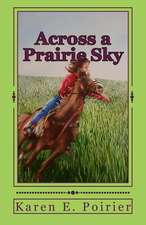Instructions for a Heatwave
Autor Maggie O'Farrellen Limba Engleză Paperback – 5 mai 2014
Vezi toate premiile Carte premiată
Gretta Riordan wakes on a stultifying July morning to find that her husband of forty years has gone to get the paper and vanished, cleaning out his bank account along the way. Gretta’s three grown children converge on their parents’ home for the first time in years: Michael Francis, a history teacher whose marriage is failing; Monica, with two stepdaughters who despise her and a blighted past that has driven away the younger sister she once adored; and Aoife, the youngest, now living in Manhattan, a smart, immensely resourceful young woman who has arranged her entire life to conceal a devastating secret.
Maggie O’Farrell writes with exceptional grace and sensitivity about marriage, about the mysteries that inhere within families, and the fault lines over which we build our lives—the secrets we hide from the people who know and love us best. In a novel that stretches from the heart of London to New York City’s Upper West Side to a remote village on the coast of Ireland, O’Farrell paints a bracing portrait of a family falling apart and coming together with hard-won, life-changing truths about who they really are.
| Toate formatele și edițiile | Preț | Express |
|---|---|---|
| Paperback (3) | 53.14 lei 3-5 săpt. | +26.47 lei 4-10 zile |
| Headline – 29 aug 2013 | 53.14 lei 3-5 săpt. | +26.47 lei 4-10 zile |
| VINTAGE BOOKS – 5 mai 2014 | 91.96 lei 3-5 săpt. | |
| Harper Collins Publishers – 5 mai 2014 | 109.26 lei 3-5 săpt. |
Preț: 91.96 lei
Nou
17.60€ • 18.31$ • 14.53£
Carte disponibilă
Livrare economică 25 martie-08 aprilie
Specificații
ISBN-10: 0345804716
Pagini: 319
Dimensiuni: 130 x 201 x 20 mm
Greutate: 0.25 kg
Editura: VINTAGE BOOKS
Notă biografică
Extras
The heat, the heat. It wakes Gretta just after dawn, propelling her from the bed and down the stairs. It inhabits the house like a guest who has outstayed his welcome: it lies along corridors, it circles around curtains, it lolls heavily on sofas and chairs. The air in the kitchen is like a solid entity filling the space, pushing Gretta down into the floor, against the side of the table.
Only she would choose to bake bread in such weather.
Consider her now, yanking open the oven and grimacing in its scorching blast as she pulls out the bread tin. She is in her nightdress, hair still wound onto curlers. She takes two steps backwards and tips the steaming loaf into the sink, the weight of it reminding her, as it always does, of a baby, a newborn, the packed, damp warmth of it.
She has made soda bread three times a week for her entire married life. She is not about to let a little thing like a heatwave get in the way of that. Of course, living in London, it is impossible to get buttermilk; she has to make do with a mixture of half milk and half yogurt. A woman at Mass told her it worked and it does, up to a point, but it is never quite the same.
At a clacking sound on the lino behind her, she says, “Is that you? Bread’s ready.”
“It’s going to be—” he begins, then stops.
Gretta waits for a moment before turning around. Robert is standing between the sink and the table, his large hands upturned, as if he’s holding a tea tray. He is staring at some-thing. The tarnished chrome of the tap, perhaps, the runnels of the draining board, that rusting enamel pan. Everything around them is so familiar, it’s impossible sometimes to tell what your eye has been trained upon, the way a person can no longer hear the individual notes of a known piece of music.
“It’s going to be a what?” she demands. He doesn’t reply. She moves towards him and places a palm on his shoulder. “You all right?” She has, of late, been finding herself reminded of his age, the sudden stoop of his back, the look of mild confusion on his face.
“What?” He swings his head around to look at her, as if startled by her touch. “Yes.” He nods. “Of course. I was just saying it’s going to be another hot one today.”
He shuffles sideways, just as she’d known he would, towards the thermometer, which clings, by a spit-moistened sucker, to the outside of the window.
It is the third month of the drought. For ten days now the heat has passed 90ºF. There has been no rain—not for days, not for weeks, not for months. No clouds pass, slow and stately as ships, over the roofs of these houses.
With a metallic click, like that of a hammer tapping a nail, a black spot lands on the window, as if pulled there by magnetic force. Robert, still peering at the thermometer, flinches. The insect has a striated underside, six legs splaying outwards. Another appears, at the other end of the window, then another, then another.
“Those buggers are back,” he murmurs.
Gretta comes to see, jamming on her glasses. Together, they peer at them, transfixed.
Swarms of red-backed aphids have, in the past week, been passing over the city. They mass in trees, on car windscreens. They catch in the hair of children coming home from school, they find their way into the mouths of those crazy enough to cycle in this heat, their feet adhere to the sun-creamed limbs of people lying in their back gardens.
The aphids fling themselves from the window, their feet detaching at the same moment, as if alerted by some secret signal, and they disappear into the azure sky.
Gretta and Robert straighten up, in unison, relieved.
“That’s them gone,” he says.
She sees him glance at the clock on the wall—a quarter to seven. At precisely this time, for more than thirty years, he would leave the house. He would take his coat off the peg by the door, pick up his bag, call goodbye to them all, shouting and squawking in the kitchen, and slam the door behind him. He always left at six forty-five, on the proverbial dot, no matter what was happening, whether Michael Francis was refusing to get out of bed, whether Aoife was kicking up a stink about Godknowswhat, whether Monica was trying to take over the cooking of the bacon. Not his department, all that, never was. Six forty-five, and he was out the door, gone.
He seems to feel a twitching in his limbs, she’s noticed, a kind of vestigial urge to set off, to get going, to be out in the world. Any minute now, she knows, he’ll be off to the newsagent’s.
With a hand on her bad hip, she pushes the chair out from the table with her foot, and Robert says, “I’ll just go round the corner and get the paper.
“Right you are,” she says, without looking up. “See you in a bit.”
Gretta sits herself down at the table. Robert has arranged everything she needs: a plate, a knife, a bowl with a spoon, a pat of butter, a jar of marmalade. It is in such small acts of kindness that people know they are loved. Which is, she reflects as she moves the sugar bowl to one side, surprisingly rare at their age. So many friends of hers feel overlooked or outgrown or unseen by their husbands, like furniture kept too long. But not her. Robert likes to know where she is at all times, he frets if she leaves the house without telling him, gets edgy if she slips away with-out him seeing, and starts ringing the children to question them on her whereabouts. It used to drive her crazy when they were first married—she used to long for a bit of invisibility, a bit of liberty—but she’s used to it now. Gretta saws a hunk from the end of the loaf and slathers it with butter. She gets a terrible weakness in her limbs if she doesn’t eat regularly. She told a doctor, years ago, that she thought she had hypoglycemia, after reading about it in a Sunday newspaper. Which would have explained her need to eat quite so often, wouldn’t it? But the doctor hadn’t even looked up from his prescription pad. “No such luck, I’m afraid, Mrs. Riordan,” he’d said, the cheeky so-and-so, and handed her a diet sheet.
The children all love this bread. She makes an extra loaf if she’s going to visit any of them and takes it, wrapped in a tea towel. She’s always done her best to keep Ireland alive in her London-born children. The girls both went to Irish-dancing classes. They had to catch the bus all the way to a place in Cam-den Town. Gretta used to take a cake tin of brack or gingerbread with her to pass around to the other mothers—exiled like her from Cork, from Dublin, from Donegal—and they would watch their daughters dip up and dip down, tap their feet in time to the fiddle. Monica, the teacher had said after only three lessons, had talent, had the potential to be a champion. She always knew, the teacher had said, she could always spot them. But Monica hadn’t wanted to become a champion or to enter the competitions. I hate it, she’d whisper, I hate it when everyone looks at you, when the judges write things down. She’d always been so fearful, so cautious, so backwards in coming forwards. Was it Gretta’s fault, or were children born like that? Hard to know. Either way, she’d had to allow Monica to give up the dancing, which was a crying shame.
Gretta had insisted on regular Mass and communion for each of them (although look how that had turned out). They’d gone to Ireland every year for the summer, fi rst to her mother’s and then to the cottage on Omey Island, even when they’d got older and started to moan about the journey. When Aoife was little, she’d loved the excitement of having to wait for the tide to draw back off the causeway, revealing the slick, glassy sand, before they could walk over. “It’s only an island sometimes,” Aoife had said once, when she was about six, “isn’t that right, Mammy?” And Gretta had hugged her and told her how clever she was. She’d been a strange child, always coming out with things like that.
They were perfect, those summers, she thinks now, as she bites down into her second slice of bread. Monica and Michael Francis out roaming until all hours and, when Aoife came along, a baby in a crib to keep her company in the kitchen, before she went out to call the others in for their tea.
No, she couldn’t have done any more. And yet Michael Fran-cis had given his children the most English of English names. Not even an Irish middle name, she’d asked. She wouldn’t allow herself to think about how they were growing up heathen. When she’d mentioned to her daughter-in-law that she knew of a lovely Irish-dance school in Camden, not far from them, her daughter-in-law had laughed. In her face. And said—what was it?—is that the one where you’re not allowed to move your arms?
About Aoife, of course, the less said the better. She’d gone off to America. Never called. Never wrote. Living with some-body, Gretta suspects. Nobody has told her this; call it a mother’s instinct. Leave her alone, Michael Francis always says, if Gretta starts to question him about Aoife. Because she knows Michael Francis will know, if anyone does. Always as thick as thieves, those two, despite the age gap.
The last they’d heard from Aoife was a postcard at Christ-mas. A postcard. A picture of the Empire State Building on it. For the love of God, she’d shouted, when Robert handed it to her, is she not even able to stretch to a Christmas card, now? As if, she’d continued to shout, I’d never given her a proper upbringing. She’d spent the better part of three weeks sewing a communion dress for that child and she’d looked like an angel. Everybody said so. Who’d have thought then, as she’d stood on the church steps in her white dress and white lace ankle socks, veil fl uttering in the breeze, that she’d grow up so ungrateful, so thoughtless that she’d send a picture of a building to her mother to mark the Christ Child’s birthday?
Gretta sniffs as she dips her knife into the red mouth of the jam pot. Aoife doesn’t bear thinking about. The black sheep, her own sister had called her that time, and Gretta had fl own off the handle and told her to mind her bloody tongue, but she has to concede that Bridie had a point.
She crosses herself, says a swift novena for her youngest child under her breath, under the ever-watchful eye of Our Lady, who looks down from the kitchen wall. She cuts another slice of bread, watching the steam vanish into the air. She will not think about Aoife now. There are plenty of good things to focus on instead. Monica might ring tonight—Gretta had told her she’d be near the phone from six. Michael Francis had as good as promised to bring the children over this weekend. She will not think about Aoife, she will not look at the photo of her in the communion outfi t that sits on the mantelpiece, no, she will not.
After putting the bread back on the rack to air for Rob-ert, Gretta eats a spoonful of jam, just to keep herself going, then another. She glances up at the clock. Quarter past already. Rob-ert should be back by now. Maybe he bumped into someone and got talking. She wants to ask him will he drive her to the market this afternoon, after the crowds heading to the football stadium have dispersed? She needs a couple of things, some fl our, a few eggs wouldn’t go amiss. Where could they go to escape the heat? Maybe a cup of tea at that place with the good scones. They could walk down the street, arm in arm, take the air. Talk to a few people. It was important to keep him busy: ever since the retirement, he can become brooding and bored if confi ned to the house for too long. She likes to organize these outings for them.
Gretta goes out through the living room into the hall, opens the front door and walks out onto the path, sidestepping that rusting carcass of a bicycle Robert uses. She looks left, she looks
right. She sees next door’s cat arch its back, then walk in mincing, feline steps along the wall, towards the lilac bush, where it proceeds to scratch its claws. The road is empty. No one about. She sees a red car caught mid-maneuver, farther up the road. A magpie keens and moans overhead, wheeling sideways in the sky, wing pointing downwards. In the distance, a bus grinds up the hill, a child trundles on a scooter along the pavement, someone somewhere turns on a radio. Gretta puts her hands on her hips. She calls her husband’s name, once, twice. The flank of the garden wall throws the sound back to her.
Stoke Newington, London
Michael has walked from Finsbury Park station. A mad decision in the heat, even at this time of day. But the roads had been choked when he’d emerged aboveground, the buses stranded in traffi c, wheels motionless on the softening tarmac, so he’d set off along the pavement, between the houses that seemed to transpire heat from their very bricks, making the streets into sweltering runnels through which he must toil. He pauses, panting and perspiring, in the shade of the trees that fringe Clissold Park. Removing his tie and freeing his shirt from his trousers, he surveys the damage wreaked by this neverending heatwave: the park is no longer the undulating green lung he has always loved. He has been coming here since he was a child: his mother would pack a picnic—hard-boiled eggs, bluish under their crumbling shells, water that tasted of Tupperware, a wedge of tea cake each; they would all be handed a bag to
carry off the bus, even Aoife. “No shirkers,” his mother would say loudly, as they stood waiting for the door to open, making the rest of the bus look around. He can remember pushing Aoife in her striped buggy along the path by the railings, trying to get her off to sleep; he can remember his mother trying to coax Monica into that paddling pool. He recalls the park as a space of differing shades of green: the full emerald sweeps of grass, the plintering verdigris of the paddling pool, the lime-yellow of the light through the trees. But now the grass is a scorched ocher, the bare earth showing through, and the trees offer up limp leaves to the unmoving air, as if in reproach.
He draws in a breath through his nose and, realizing that the dry air burns his nostrils, takes a look at his watch. Just after five. He should get home.
It is the last day of term, the start of the long summer holidays. He has made it to the end of another school year. No more marking, no more classes, no more getting up and getting out in the mornings for six whole weeks. His relief is so enormous that it manifests itself physically, as a weightless, almost dizzy sensation at the back of his head; he has the sense he might stumble if he moves too quickly, so unburdened, so untethered does he feel. He sets off in the most direct route, straight across the burntout grass, out into the shadeless open, where the light is level and merciless, past the shut café where he longed to eat as a child but never did. Daylight robbery, his mother called it, unwrapping sandwiches from their grease-proof shrouds.
Sweat breaks out in his hairline, along his spine, his feet move jerkily over the ground and he wonders, not for the first time, how others might see him. A father, returning from his place of work to his home, where his family and his dinner will be waiting. Or a man overheated and sweaty, late, carrying too many books, too many papers, in his briefcase. A person past youth, hair thinning just a little at the crown, wearing shoes that need resoling and socks that require a darn. A man tormented by this heatwave because how is one supposed to dress for work in temperatures such as this, in a shirt and a tie, for God’s sake, in long trousers, and how is one meant to concentrate when the female inhabitants of the city walk about pavements and sit in offices in the briefest of shorts, their legs bare and brown and crossed against him, in narrow-strapped tops with their shoulders exposed, just the thinnest of fabrics separating their breasts from the unbearably hot air? A man hurrying home to a wife who will no longer look him in the eye, no longer seek his touch, a wife whose cool indifference has provoked in him such a slow-burning, low-level panic that he cannot sleep in his own bed, cannot sit easily in his own house.
The edge of the park is in sight now. He’s almost there. One more stretch of grass in full sun, then a road, then around the corner, then it’s his street. He can make out the roofs of his neighbors and, if he stretches on tiptoe, the slates of his house, the chimney pot, the skylight beneath which, he is sure, his wife will be sitting.
He swats a bead of moisture from his upper lip and switches his briefcase to the opposite hand. At the end of his street, there is a queue at the standpipe. Several of his neighbors, a lady from down the road and a few others he doesn’t recognize, straggle across the pavement and onto the road, empty drums at their feet. Some of them chat to each other, one or two wave or nod to him as he passes. The thought that he ought to offer to help the lady passes through his mind; he ought to stop, fill her drum for her, carry it back to her house. It would be the right thing to do. She is his mother’s age, perhaps older. He should stop, offer help. How will she manage otherwise? But his feet don’t hesitate in their movement. He has to get home, he can’t brook any further delay.
He unlatches his gate and swings it open, feeling as though it has been weeks since he last saw his home, feeling joy surge through him at the thought that he doesn’t have to leave it for
six weeks. He loves this place, this house. He loves the black-and-white-tiled front path, the orange-painted front door, with the lion-faced knocker and the blue glass insets. If he could,
he would stretch himself skywards until he was big enough to embrace its red-gray bricks. The fact that he has bought it with his own money—or some of his own money, along with a large mortgage—never ceases to amaze him. That, and the fact it contains at this very moment the three people most precious to him in the world.
He unlocks the door, steps onto the mat, flings his bag to the floor and shouts, “Hello! I’m home!”
He is, for a moment, exactly the person he is meant to be: a man, returning from work, on the threshold of his home, about to greet his family. There is no difference, no schism, between the way the world might see him and the person he privately knows himself to be.
“Hello?” he calls again.
The house makes no answer. He shuts the door behind him and picks his way through the flotsam of bricks, dolls’ clothes and plastic teacups on the hall floor.
Recenzii
“Smart and provocative . . . O’Farrell has made her mark by combining the elements of good old-fashioned drama with a modern lightness of touch in language and a deft freedom in moving her narratives forward through juxtaposition rather than linear plotting . . . Over and over, she tries to work out who people really are, how ordinary lives can conceal extraordinary stories.”
ߝThe New York Times Book Review
“Maggie O’Farrell has written my favorite kind of novel: big-hearted, psychologically complex, and utterly gripping from page one. Her spare and subtle prose yields a narrative of extraordinary power. Instructions for a Heatwave is a quiet masterpiece, one I’ll be recommending for years to come.”
ߝMaria Semple, author of Where’d You Go, Bernadette
“Instructions for a Heatwave is a thoroughly engrossing and suspenseful novel about an Irish family and its disparate members coming together one unbearably hot summer. Their mission is to find a father who has wandered off. Their unspoken mission is to rediscover and forgive each other for a lifetime of slights and betrayals, real and imagined. O’Farrell, in this beautifully-written tale, gets the psychological nuances just right.”
ߝAnita Shreve
“A rich, barbed interplay among siblings, who gibe, snap, and snipe as they go through their father's things, slowly teasing out one another's long-buried secrets—and a few of Gretta’s and Robert’s, too."
ߝEntertainment Weekly, Grade: A-
“O’Farrell should be a household name.”
ߝLibrary Journal
“Superlative . . . A reunion of far-flung siblings for a Mike Leigh-style extravaganza of reckonings and reconciliations.”
ߝVogue
“A piercing portrait of a family falling apart and coming together again.”
ߝGood Housekeeping
“Thoughtful, expressive . . . Heatwave celebrates the particularly maddening and recognizable ways a family can shape us.”
ߝFredericksburg Free Lance-Star
“An Irish family saga, replete with secrets, rivalries, and misbehavior becomes a compelling and entertaining story in Maggie O’Farrell’s hands . . . O’Farrell takes readers on journeys interior and exterior—recounted in flawless prose that will have you reading while strap-hanging, standing in line, or waiting at a stop light.”
ߝShelf Awareness
“Riveting . . . Finely drawn . . . Once again, O’Farrell demonstrates her mastery at depicting strained relationships, skewed family loyalties, and the just reachable light at the end of the tunnel.”
ߝMinneapolis Star Tribune
“A sizzling family dynamic radiates off the pages of this novel.”
ߝEW.com, “The Must List”
“A beautiful portrait of family life. The story really blossoms in the second half . . . where the family’s secrets and private feuds come raging forth so that the true healing can begin.”
ߝBooklist
“Lyrical . . . vivid . . . The power and resonance of the book is the journey the family members take during this scorching period in time . . . Read Instructions for a Heatwave and see if these characters, this family, with their secrets and insanity, don’t seep into your bones like the hot summer sun.”
ߝMy Shelf Confessions
“A story of self-discovery and coming to terms with the truths that are ever present in our lives . . . It’s one of those rare books that balances each narrative device, plot point, and character perfectly, such that readers will be absolutely mesmerized by this book from beginning to end.”
ߝS. Krishna’s Books
“Maggie O’Farrell’s Instructions for a Heatwave is just the kind of family drama I love: Nobody gets off easy in it, but everybody gets treated with compassion. It’s stylish, funny, smart and skillfully written, and I could not put it down.”
ߝJami Attenberg, author of The Middlesteins
“A beautifully written and perfectly observed story of family, secrets, and forgiveness. Instructions for a Heatwave is an absolute gem. It’s the kind of novel that you want to devour and savor at the same time.”
ߝCourtney Sullivan
“Acutely observed…revelatory, redemptive, and moving…There is a deliciousness to this novel, a warmth and readability that render it unputdownable and will surely make it a hit. O’Farrell has done it again.”
ߝJoanna Briscoe, The Guardian
“An accomplished and addictive story told with real humanity, warmth, and infectious love for the characters. Highly recommended.”
ߝViv Groskop, The Observer
“A literary event…evocative, articulate, and joyously readable…O’Farrell’s talent for drawing intriguing but relatable characters is eclipsed only by a rare gift for description that is almost photographic in its imagery…An author at the top of her game.”
ߝCharlotte Heathcote, The Sunday Express
“Humorous, humane, and perceptive…O’Farrell depicts relationships with piercing acuity in haunting, intense prose…a deliciously insightful writer…Her sharp but humane eye dissects every form of human interaction.”
ߝLeyla Sanai, The Independent on Sunday
“Elegant, lyrical, and subtle…O’Farell’s a compassionate writer, showing us every member of the family from a variety of viewpoints, ensuring that we understand and feel for every one of them even as they drive each other mad…The Riordans will stay in your mind long after you finish reading this book. They’re funny, infuriating, and impossible not to love. They feel like family.”
ߝAnna Carey, The Irish Times
“Thoroughly absorbing and beautifully written…A novel about what we say and what other people hear; about families; what we don’t tell each other and what we do; the compromises and accommodations we make and what happens when we build our lives around half-truths.”
ߝVictoria Moore, Daily Mail
“A ripping yarn…A brilliant domestic drama that teeters on the edge of being a thriller; it’ll hook you in at the start and keep you dangling.”
ߝKatie Law, Evening Standard
“O’Farrell is adept at creating pace out of the intricacies of family relations. She keeps the gas up on the Bunsen burner throughout...I felt that I gobbled this book.”
ߝVicky Allan, The Herald
“Farrell’s language is lissom, airborne, mostly seamless, her characters flawed, contradictory, aggravating and instantly knowable. This is a deceptively easy, effortlessly true-feeling novel; a total delight.”
ߝClaire Allfree, Metro
“O’Farrell is hard to beat. Anyone looking for a British equivalent of Anne Tyler need look no further.”
ߝDavid Robinson, The Scotsman
“A surprising, beautiful novel, full of the intricacies of family life…You’ll find yourself wanting to devour it in one sitting.”
ߝClaire Frost, Fabulous Magazine
Descriere
A story of a dysfunctional but deeply loveable family reunited, set during the legendary summer of 1976, INSTRUCTIONS FOR A HEATWAVE by Maggie O'Farrell was shortlisted for the 2013 Costa Novel Award and was a Sunday Times Top Ten bestseller (2013).
It's July 1976. In London, it hasn't rained for months, gardens are filled with aphids, water comes from a standpipe, and Robert Riordan tells his wife Gretta that he's going round the corner to buy a newspaper. He doesn't come back. The search for Robert brings Gretta's children - two estranged sisters and a brother on the brink of divorce - back home, each with different ideas as to where their father might have gone. None of them suspects that their mother might have an explanation that even now she cannot share.
Premii
- Costa Book Awards Nominee, 2013
